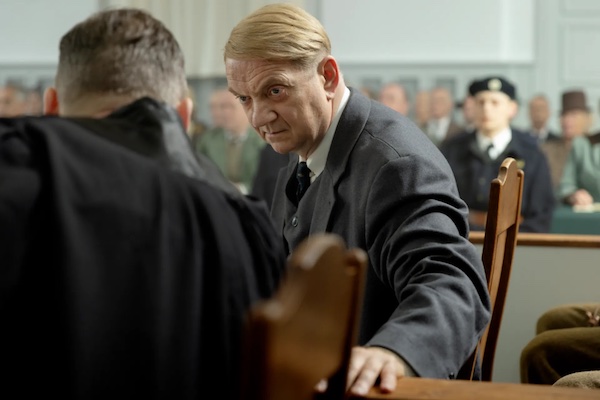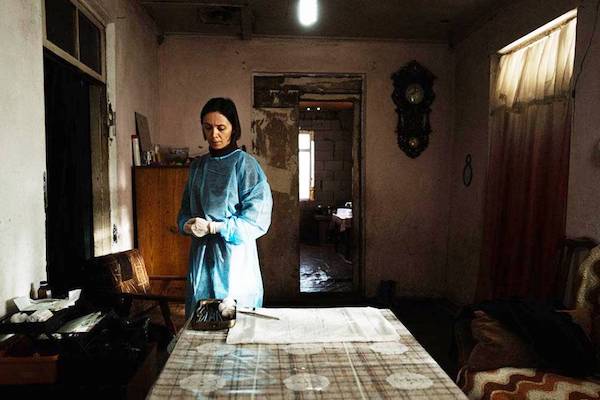Film Reviews: At the Toronto International Film Festival — Nazi Puppet in Norway and Abortion Saga in Georgia
By David D’Arcy
Two closely watched films in Toronto were dark dramas that couldn’t have been more different.

Gard B. Eidsvold in Quisling – The Final Days. Photo: Agnete Brun
Who outside of Norway remembers Vidkun Quisling today? Maybe historians and students of the Second World War. Quisling (1887-1945) was prime minister of Norway during the German occupation, a gruff enforcer for the Nazis whose name became synonymous with collaborator.
Quisling’s rule was harsh, just what the Nazis wanted. Norway deported a thousand Jews to camps in Poland. Not so many, compared to the horrific broader picture, but only 12 of them returned. Quisling – The Final Days, picks up the narrative when the Germans surrender in May 1945 and the puppet prime minister, who expected to be treated with the respect befitting his office, is arrested. A young Lutheran pastor, Peder Olsen (Andres Danielsen Lie), is assigned to minister to Quisling (Gard B. Eidsvold) in prison after the church’s primate refuses the task. Erik Poppe’s gripping film, adapted from diaries kept by Olsen and his wife, takes us from the traitor’s loud assertions of patriotism, to a court’s judgment, to his execution by a firing squad. It’s a grim study of denial and defeat.
“Surely there must be some civilized people left in this country,” a baffled Quisling pleads before turning himself in, “you’re calling me a criminal ….. I’ve worked so hard for this country.” So much for remorse.
Eidsvold plays the man who led occupied Norway under Hitler as smug and certain in his politics. Even when the Germans surrender, the leader who met with Hitler as late as January 1945 is shocked when he’s put in handcuffs. Locked in a prison cell before his trial, he finds his spiritual future placed in the hands of the pious young Olsen, who is sworn to secrecy about counseling the collaborator. Like any tyrant, Quisling is angry and impatient. Struggling to sleep on his cot, he asks the young guard attending to him to switch the bright light off. The guard turns it off and back on again, an everyman’s expression of the country’s loathing for the thug claiming to be a misunderstood patriot, now brought down to size.
At every step, caged and scorned, Eidsvold brings rage, but also an unexpected subtlety, to the role of his country’s official bully. Not to give too much away, but the final third of the film takes place almost entirely in the condemned man’s cell, where pride battles with a stark begrudging recognition of mortality. We watch this struggle in relentless closeups. Poppe doesn’t flinch from showing the final moments of those final days.
Norway tends to focus on the underground heroism of some brave citizens rather than the many who collaborated during the wartime Quisling years. There’s still nothing revisionist here about Quisling’s crimes. But questions arise as we watch the man try to come to terms with himself with the help of Olsen the clergyman. Attempting to get the former strong man to open up, Olsen admits that there were moments during the just-ended war when he himself was less than admirable, a confession that the self-satisfied Quisling is willing to accept. But that’s about as far as kinship goes between a minister who endured the occupation and the traitor who presided over it.
Then there is the parallel to European politics today, where reactionary extremists are applauded, not punished, and court their counterparts on the American Right.
Those autocrats are not the simple stooges of foreign enemies, except in Putin-dependent Belarus (and in Ukraine before 2014). Yet in Quisling’s claims of being persecuted and misunderstood, and in his constant lies about serving Norway while following orders from Berlin, we find the same pattern of lying in the palaver of those would-be strong men close to home today. In our case, a leader who has already threatened to punish those who stood in his way after the last election – including Jews who vote against him this time – may not need an occupying army to install him back into power.
It’s a sobering prospect to consider, after watching scenes in which a country exults in the downfall of a tyrant.

A scene from April. Photo: TIFF
The politics in Georgian director Dea Kulumbegashvili’s April lurch backward and forward through a bleak and cryptically symbolic drama that explores the risks and the stigma of abortion in rural Georgia (the former Soviet republic). And there’s a lot more than politics in this sometimes inscrutable film.
The deadpan Nina (Ia Sukhitashvili) is an obstetrician who supplements her income performing abortions in the countryside, a foreboding expanse which we encounter mostly in the dark. Think of the shadowy emptiness of a place haunted by visions worthy of Bela Tarr, and then place a pregnant patient there whose medical history is unknown and who forbids any emergency surgery. It is a recipe for things to go wrong. A baby is still-born under those conditions to a woman who refuses to have a cesarean section. Nina is forced to defend herself against accusations by the mother’s angry husband and by superiors at her daytime hospital job. Abortion may be legal in Georgia, but it is culturally taboo in much of the country.
This parable about the sufferings of women in a male-dominated culture and the plight of women who try to help them is unnerving in its fatalism. The action — if that’s the right word — moves at a creeping pace, another Tarr trademark. April can feel like a horror film without a monster. Yet Kulumbegashvili gives us a figure – a character? – thats monstrous enough. That presence is a humanoid shape with reptilian textures that slinks around – an observer of injustices, a witness of rural horrors, a victim, a conscience?
If this odd figure in cutaway shots defies explanation, other elements in this film of chilling visuals come off as clear as an anthropologist’s journal. Women stuck in village life are doomed to be pregnant most of the time, and the culture is so closed that medicine isn’t given the opportunity to help them. April will be praised for the staggering power of its images which appear like bumps in the road on which Nina drives her car in the dark. That said, the jostling arrhythmia of the director’s picaresque storytelling (plus the spectral creature) suggest that what we have here are parts of a whole that’s still in pursuit of a style. The film feels like a work in progress – imaginative and improvised — akin to the medical procedures that the film depicts with so much uneasiness. Like the patients in April, audiences who can bear the experience will be grateful to receive what help Kulumbegashvili provides.
David D’Arcy lives in New York. For years, he was a programmer for the Haifa International Film Festival in Israel. He writes about art for many publications, including the Art Newspaper. He produced and co-wrote the documentary Portrait of Wally (2012), about the fight over a Nazi-looted painting found at the Museum of Modern Art in Manhattan.
Tagged: "Quisling – The Final Days", April, Dea Kulumbegashvili, Erik Poppe, Toronto International Film Festival

